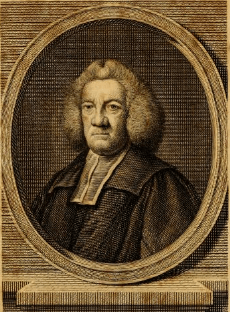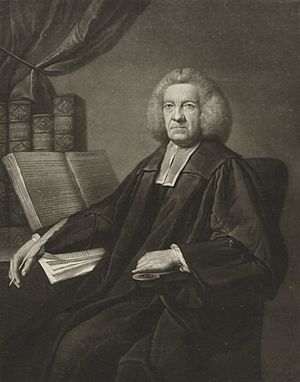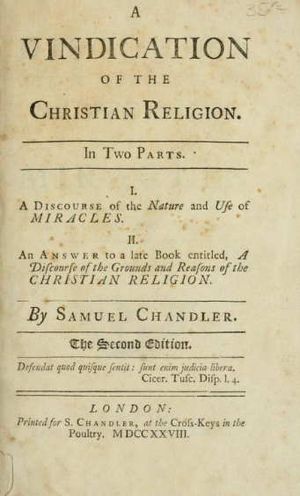Samuel Chandler facts for kids
Samuel Chandler (born 1693 – died 8 May 1766) was an English minister who did not follow the official Church of England. He was also a writer of short books called pamphlets. Many people saw him as a very important leader for those who disagreed with the Church of England, often called "Dissenters," during the time of King George II.
Contents
Early Life and Education
Samuel Chandler was born in Hungerford, Berkshire. His father, Henry Chandler, was also a Dissenting minister. A Dissenting minister was a religious leader who belonged to a Protestant group separate from the Church of England. His father was the first Presbyterian minister in Hungerford after the Toleration Act 1688. This law allowed Protestants who were not part of the Church of England to worship freely.
Around 1700, Samuel's family moved to Bath. His father continued to lead a church there. Samuel was the younger brother of Mary Chandler, a poet from Bath. He even wrote about her life for a famous book series.
From a young age, Samuel showed a great love for learning. His family encouraged this. He was very good at studying old languages like Greek. He went to a special school for Dissenters in Bridgwater. Later, he studied at Samuel Jones' academy in Gloucester. There, he became friends with Joseph Butler and Thomas Secker. These friends later became important leaders in the Church of England, but they remained close with Samuel throughout their lives.
Starting His Career
In 1714, Samuel Chandler began preaching in London. He lived with his friend Secker, who had returned from studying abroad. In 1716, Samuel became the minister of the Presbyterian Hanover Chapel in Peckham. He was officially made a minister in December of that year.
A big financial disaster hit in 1720, known as the South Sea Bubble. Samuel lost all the money his wife had brought into their marriage. This made things very difficult for him financially. So, from about 1723, he started working as a bookseller to earn more money. He sold books at a shop called the Cross Keys in London.
In 1725, Samuel published a book called A Vindication of the Christian Religion. This book defended Christian beliefs. The Archbishop of Canterbury, William Wake, was very impressed. He wrote to Samuel, saying it was a shame he had to sell books instead of just writing them.
Because his book was so successful, Samuel was invited to be an assistant minister. This was at the Old Jewry Meeting-house, a well-known Dissenting church, in 1726. He continued to preach at Peckham as well. In 1728, he became the main pastor at the Old Jewry. The church offered him extra money if he stopped selling books, which he did. He stayed in this important role for the rest of his life.
Samuel became a very influential leader among London Dissenters. He joined important groups like the Presbyterian Board and Dr Williams's Trust. Thanks to his efforts, a special charity was started in 1733. This charity helped widows and orphaned children of Protestant Dissenting ministers. He also helped create a society in 1753 to spread knowledge of God among Germans in the British colony of Pennsylvania.
Beliefs and Writings
Samuel Chandler wrote many books, pamphlets, and letters. He actively joined in the religious discussions of his time. He strongly believed in civil and religious liberty. This meant he supported freedom of thought and using reason to understand religious beliefs.
He once wrote: "It's great to see that ideas of freedom are growing every day. People who judge others harshly are now often seen as enemies to everyone. Serious looks and bossy orders can no longer be used as arguments."
His ideas were similar to those of the Christian thinker Samuel Clarke and the philosopher John Locke.
Debates on Faith and Freedom
Samuel Chandler was part of the more open-minded group of Dissenters. He believed that understanding the Bible through reason was enough. He did not like the idea of forcing people to agree to specific statements of faith or creeds.
In 1719, there was a big debate among Dissenters called the Salters' Hall controversy. It was about whether ministers had to agree to the doctrine of the Trinity. Samuel was among the majority who said they should not be forced to sign such statements. His own beliefs about the Trinity were influenced by Samuel Clarke. Some people described Chandler as having "Arian leanings," meaning his views were similar to Arianism, which differs from the traditional Trinity doctrine.
In 1731, he translated a book about the Inquisition, a historical religious court. In his introduction, he wrote that forcing people to agree to statements of faith had "always been a problem in the Church of God." He continued to write about this topic in other publications.
In the 1730s, Samuel Chandler spoke out against laws that limited Dissenters' rights. These "penal laws" prevented them from fully participating in public life. In 1732, he wrote a pamphlet supporting those who wanted these laws removed. In 1735, his sermons against Roman Catholicism also included calls to repeal the Test Act and Corporation Act 1661. These acts required people to be members of the Church of England to hold public office.
By 1748, Samuel felt less interested in these political debates. He believed it was more important for different Christian groups to work together against what he saw as the "wickedness of the present generation." He had good relationships with leaders of the Church of England who were also open-minded. He even discussed the idea of Dissenters joining the Church of England if some changes were made. He suggested rewriting the church's articles of faith in simpler, biblical language and removing the Athanasian Creed. However, these ideas did not happen, and some fellow Dissenters felt he had overstepped.
Defending Christianity
Samuel Chandler also strongly defended Christianity against people called Deists. Deists believed in God but thought that God did not interfere with the world after creating it. They often questioned miracles and prophecies.
In his books A Vindication of the Christian Religion (1725) and Reflections on the Conduct of Modern Deists (1727), he argued that miracles and prophecies proved Christianity was true. At the same time, he believed Deists had the right to express their views. He argued against those who wanted to censor them.
He also defended the Old Testament. In 1741, he wrote A Vindication of the History of the Old Testament. This was a response to a Deist writer who had criticized the biblical story of Joseph. Samuel followed this with Defence of the Prime Ministry and Character of Joseph in 1743.
Another Deist, Peter Annet, questioned the resurrection of Jesus. Samuel Chandler responded with The Witnesses of the Resurrection of Jesus re-examined (1744). Another scholar, John Leland, called it a "very valuable book" that showed "great clearness and judgement."
Samuel's book Plain Reasons for Being a Christian (1730) also argued for Christianity. He believed that human reason could understand natural religion, but that God's revelation (like the Bible) was also needed. He said that any revelation must make sense and be consistent with reason.
Opposing Roman Catholicism
Samuel Chandler was very strongly against Roman Catholicism. His opposition grew stronger when he felt that the Protestant Glorious Revolution of 1688 was threatened.
In 1735, he gave a series of lectures in London. These lectures were aimed at what Dissenters saw as a growing threat from "popery," meaning Roman Catholicism. His lectures were published as Seventeen Sermons against Popery. In these sermons, he argued for Protestant church beliefs over the claims of Roman Catholic supremacy. He was criticized by some Roman Catholics for misrepresenting their faith. Some Anglicans also criticized him for his comments about bishops.
Soon after, Samuel Chandler took part in discussions with two Roman Catholic priests in London. They debated topics like the Pope's authority and the Catholic belief in transubstantiation. Samuel wrote an account of one of these discussions.
Recognition and Influence

Andrew Kippis, a minister who worked on Samuel Chandler's writings, described him as a man with "very extensive learning, and eminent abilities." He said Samuel was quick to understand things and had sharp judgment. He was also a very good and lively preacher. His skills as a speaker and writer earned him great respect from Dissenters and many members of the Church of England.
In 1747, Archbishop Herring wrote that he truly admired Samuel Chandler. He wished that the Church of England could have him, because his spirit and learning were "certainly of the first class." Samuel was offered high and well-paid positions in the Church of England. However, he chose to remain a Presbyterian throughout his life because of his beliefs.
He was elected a Fellow of the Royal Society in December 1754. This is a very prestigious group for scientists and thinkers. The only known painting of Samuel Chandler was given to the Royal Society by his brother, John Chandler. Samuel was also a Fellow of the Society of Antiquarians, which studies old things. Like other respected Dissenters, he received honorary degrees from Edinburgh University (1755) and King's College, Aberdeen (1756). He had turned down such degrees before, joking that "so many blockheads had been made Doctors."
Later Life and Family
Samuel Chandler passed away on 8 May 1766. In his last year, he had suffered from a "very painful disorder."
He was buried in the family tomb at Bunhill Fields in London on 16 May. His friend, Thomas Amory, gave the funeral sermon at the Old Jewry. Amory later wrote a short story about Samuel's life. He and Nathaniel White took over as co-pastors at the Old Jewry after Samuel's death.
On 17 September 1719, Samuel Chandler married Elizabeth Rutter. They had six children. Two of his sons died before him. His daughters were Elizabeth, Sarah, Catherine, and Mary. Sarah married Edward Harwood, a famous scholar. Mary never married.
Samuel's wife, Elizabeth, died in 1773. She left money to her children in her will.
Major Works
- The History of the Inquisition (1731): This was Samuel's English translation of a large Latin book by Philippus van Limborch. Samuel added a long introduction to it.
- A vindication of the Christian religion (1725): This book defended Christian beliefs and miracles.
- Plain reasons for being a Christian (1730): This book explained why it made sense to be a Christian.
- The notes of the church considered (1735): A sermon he gave against Roman Catholic claims.
- The witnesses of the Resurrection of Jesus Christ re-examined (1744): This book argued for the truth of Jesus's resurrection.
- Great-Britain's memorial against the Pretender and Popery (1745): A pamphlet against the Catholic claim to the British throne.
- The case of subscription to explanatory articles of faith (1748): This book argued against forcing people to agree to specific statements of faith.
- A critical history of the life of David (1762): This book looked closely at the life of King David from the Bible.
 | Jessica Watkins |
 | Robert Henry Lawrence Jr. |
 | Mae Jemison |
 | Sian Proctor |
 | Guion Bluford |



